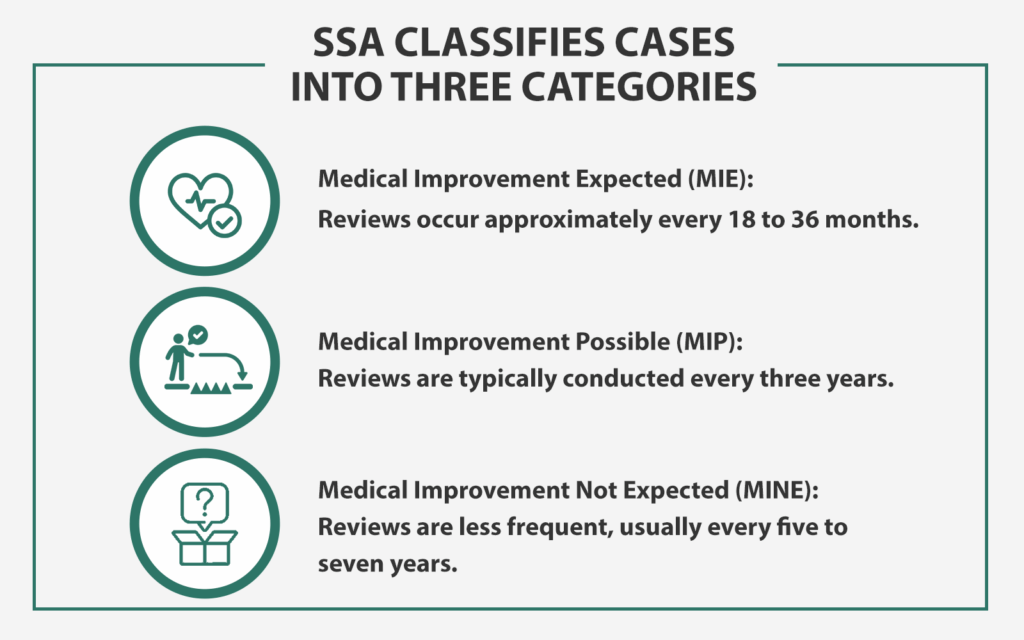
Social Security Disability Review After Age 60
Social Security Disability Insurance (SSDI or SSD) benefits are provided by the federal government to long-term workers who have become disabled by injury or illness and can no longer work enough to make a living. Only workers who paid into the Social Security fund through their payroll deductions or self-employment taxes are eligible to receive these disability benefits.
But receiving Social Security Disability benefits may not necessarily be a permanent solution to a disabled person’s financial difficulty. The Social Security Administration (SSA) conducts periodic reviews to assess whether recipients remain eligible for these benefits.
Individuals who do receive SSD benefits, especially those over 60, need to understand how these reviews are conducted and what the potential impact may be on the recipient’s financial stability.
Here at the Keener Law Firm, we represent hundreds of disabled individuals who turn to us for help dealing with Social Security periodic reviews and other issues relating to their SSD benefits. Our professional lives are devoted to helping disabled individuals throughout the US get the disability benefits to which they are entitled. Whether you have questions about SSDI or SSI, contact us for help winning and keeping your disability benefits.
What Are Disability Reviews?
Disability reviews are a standard procedure the SSAs use to ensure that only those who continue to meet the strict criteria for disability receive benefits. Naturally, many disability benefits recipient’s impairments gradually improve over time. Unfortunately, many do not. But the SSA’s primary objective in conducting these reviews is to verify whether a beneficiary’s medical condition has improved to the extent that it allows them to return to work.
Frequency of Reviews
The frequency of disability reviews depends on the nature and severity of the disability. Generally, the SSA classifies cases into three categories:

Reviews are much less frequent when disability beneficiaries reach ages 55 and 60 because their advancing age makes them less likely to be able to perform many jobs and may cause their disabling impairments to impact them more profoundly.
As disabled adults near retirement age, Social Security’s investment in reviewing their condition or retraining them for new job skills makes less economic sense for the government.
The Review Process
The disability review process involves several steps.
- Notice: The first step will be the beneficiary’s receipt of a notice from the SSA indicating that the review process is beginning.
- Documentation: During the review, benefits recipients need to provide the most current medical records and information about any work activity they may have performed. Remember, there is nothing inappropriate about engaging in some work while on SSD benefits. The fact that a benefits recipient can do some work does not mean they are well enough to work the number of hours necessary to earn more than the SGA.
- Medical Examination: If recent medical information is insufficient, the SSA might require a medical examination, which is paid for by the SSA. Again, at or after age 60, the review is conducted with the expectation that the beneficiary is unlikely to return to work.
Finally, a decision will be made based on all collected information.
Preparing for a Social Security Disability Review
Being prepared for a disability review is essential at any age. There are several things every person receiving disability benefits can do to make the process easier and to ensure that the necessary information about the nature and severity of your current impairment is clear.
- Keep Medical Records Updated: Regularly visiting your doctor and keeping thorough medical records is crucial. Failing to attend scheduled healthcare appointments on the theory that you already have your disability benefits and don’t need to keep up with the doctor is unwise. Failing to seek or comply with medical advice can weigh heavily against an SSD beneficiary, especially if doing so would improve their impairments.
- Understand Your Diagnosis: Being informed about your medical condition and how it impacts your ability to work can be beneficial during a review.
- Consult a Legal Professional: Understanding legal rights and the review process is vital. A lawyer specializing in SSDI will provide invaluable guidance to anyone going through a disability review. When you work with an experienced Social Security disability lawyer, like the skilled attorneys at the Keener Law Firm, your rights are protected and the Social Security reviewer can be directed by a knowledgeable advocate to the key information that supports your continuing to receive disability benefits.
Potential Outcomes
At the end of the review process, the SSA’s, there will be one of two outcomes. Either the disability benefits will continue or they will be ordered to stop.
Continuation of benefits means that the reviewer is satisfied that the person has not experienced an improvement in their condition to the extent that they are capable of returning to some type of work.
If the condition of the person whose disability claim is under review has improved sufficiently to engage in some substantial gainful activity, the SSA may terminate their benefits. In that case, the benefits would stop approximately two months after the decision.
Appeal, Appeal, Appeal.
If benefits are terminated, you have the right to appeal the decision, and you definitely should, especially if you are of advanced years, 50, 55, 60, or older.
The judgement of a reviewer who finds someone at these ages sufficiently fit to support themselves by working without receiving their usual Social Security disability benefits is open to genuine question.
If you are informed that your SSD benefits are terminated, contact the Keener Law Firm immediately for help. Your appeal period may expire if you do not act swiftly. You have only 60 days from the date you receive the benefits termination decision to appeal.
Impact on Mental Health
It’s important to recognize the psychological impact of the review process. The uncertainty and potential financial instability can be stressful, especially for older individuals. Seeking support from family, friends, or mental health professionals is helpful. And ensuring you are working with an experienced attorney with a deep well of knowledge in Social Security Disability law is comforting because they can reduce your fear of the unknown.